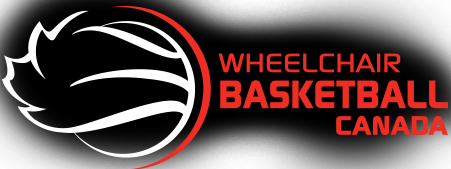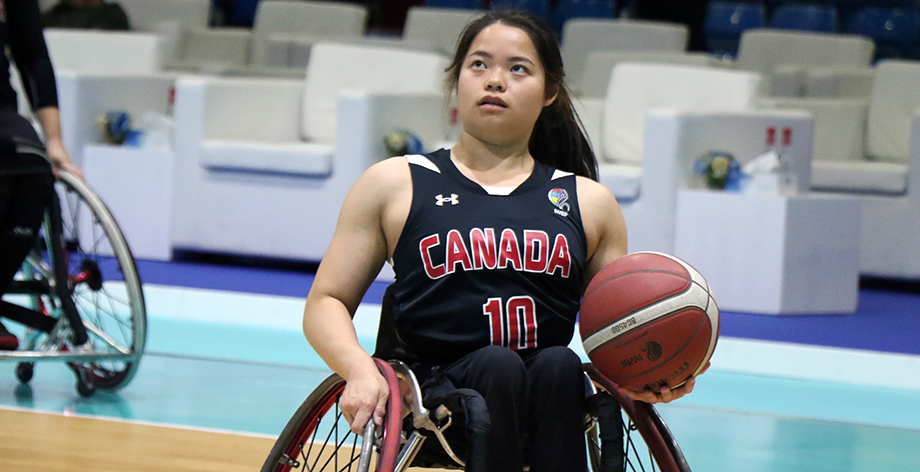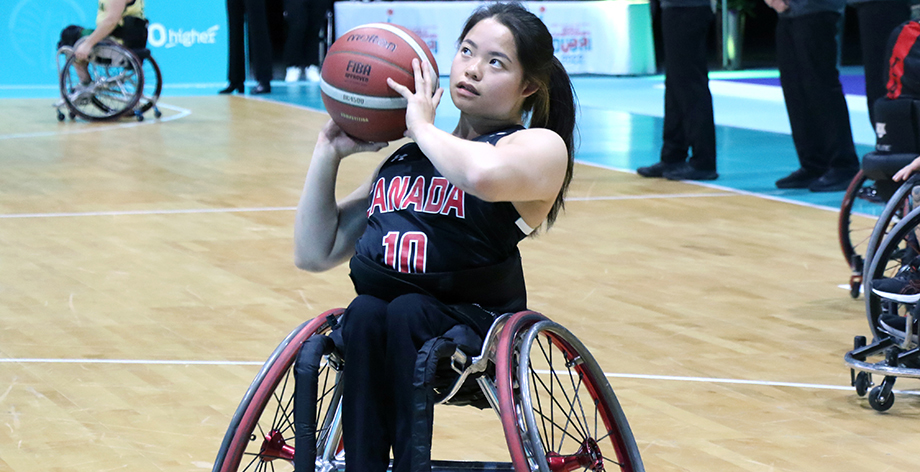Puisand writes about her journey from growing up in Toronto and discovering parasport to earning a spot on the women’s national team and working on her university degree in the July Athlete Spotlight presented by Toyota
I grew up in Etobicoke, the west part of Toronto. It was me and my twin sister. Growing up, being a twin was nice because we could always play with each other, and we never had to be thrown in new places alone. My sister was usually the troublemaker, and I’d follow her.
I was a pretty active kid growing up. I remember when I was in kindergarten, I was one of the first kids who could do the monkey bars. I just really liked being active. I had a lot of fun at summer camps, participating in swimming lessons, ballet and similar activities.
When I was six years old, I got transverse myelitis, which is the inflammation of the spine. It all just kind of happened out of the blue one night. Ever since then, I lost the ability to use my lower body.
Introduction to adaptive sports
My first introduction to parasport was when I was around nine years old. I played sledge hockey for a couple of seasons. At that time, I was super young and had no idea what was happening most of the time, but it was fun sitting on a sledge, and pushing around on the ice.
When I was around 13 years old, my parents started pushing me to find something I was interested in. I tried wheelchair tennis, wheelchair basketball, wheelchair racing, adaptive sailing and many others.
I wasn’t really into it at first. I just didn’t know what sport was, really. When I would play basketball, it would be like, ‘Oh, we’re just going back and forth putting a circular thing in another circular thing?’ I just didn’t get it. Before every practice, I would complain like any other grumpy kid forced to do something, but secretly I enjoyed it. So I just kept playing, and eventually, it became something more to me.
Wheelchair tennis
Similarly to basketball, I was hesitant about tennis at first but it grew on me pretty quickly. In 2014, I went to a junior tennis camp in Mission Viejo, California, for a week. That was my first wheelchair tennis camp and first opportunity with sport outside of Ontario. I remember meeting so many amazing athletes and coaches there who helped me see how fun and exciting tennis can be.
After that camp, I continued to learn and gain more tennis skills and began to compete in tournaments. At one point, I was ranked No. 7 in the world for girls. In 2017, Team Canada sent a junior team to the World Team Cup – it was me, along with two other athletes from B.C. The tournament was in Alghero, Italy, and it was such a memorable experience for me.
I played both wheelchair basketball and wheelchair tennis for quite a few years, and I enjoyed being able to do both. However, I knew that if I wanted to get serious about playing at the next level, I had to really dial in on one sport.
I dreaded making that decision because it meant that I had to choose one sport over another. In the end, I chose basketball because I really enjoyed the team aspect of it and how I could lean on my teammates and everyone around me. I remember the conversation I had with my tennis coach about this decision, and it broke my heart because tennis was still something I really enjoyed.
Looking back, I’m so thankful to have been able to do as much as I did up to that point because it has allowed me to become a better athlete. I play tennis occasionally, and hitting a ball around is still fun.
National Team opportunities with Wheelchair Basketball
For a while, I didn’t think I was good enough to try out for the national team. Even when Marc Antoine Ducharme came up to me in 2017 and invited me to a national team development camp in Japan, I was shocked and didn’t think I was worthy. All I was doing was playing basketball and doing the best I could. But I was excited about the opportunity and thrilled that coaches saw my potential.
When I made the national team in 2018, I was still surprised. For that cycle, I was the youngest national team member and knew I had a lot more to learn. I remember that first year with the team; it was a steep learning curve for me because I’ve never competed at that level, so it was a lot of trying to keep up with everyone. But that gave me a lot of motivation to get better because it was important to me to feel like I can have an impact on the team during games.
The next few years were also tough, but I could gradually see myself improving. I started to see the impact I could have on the court, which was the most rewarding part. Now, I have figured out my role and place on the team, and I can fully embrace the competition.
First Paralympic experience
The most memorable part about Tokyo 2020 was how many emotions I felt during the tournament. The Games represented the accumulation of all the hard work we’ve all put in in the last five years, from persisting through the pandemic to finally arriving at the Paralympic village, playing and winning our first games, then coming up short in the quarterfinals.
It was a wild ride, and although it didn’t end the way I hoped for, I wouldn’t have had it any other way. I think that’s what made my experience so special because all those highs and lows embodied the thrill and the beauty of sport.
Attending McMaster University
I was never one of those people who knew what I wanted to do for the rest of my life. I had good grades in high school, but I didn’t know what it would translate to. After eliminating things I didn’t want to do, I applied to about a dozen different programs at different universities. I chose mechanical engineering at McMaster University, which I have been enjoying so far.
For me, school always comes first before sport. After Tokyo 2020, I took about a year off from the national team to fully focus on school and the whole university experience. Before that, I was in a delicate balance between my education and sport. Although it was a tough decision for me because the team meant so much to me, it was one of my most fulfilling decisions. It was really nice to be a student, be more involved in the McMaster community, and finally get my first engineering co-op job.
Although I am still not done my degree, I am excited to return to the international wheelchair basketball world. The break gave me the boost of energy and confidence I needed, and I can’t wait to keep building that with Team Canada.
Advice for new athletes
First and foremost, enjoy the game. If you enjoy the game and keep working hard, it will take you places that you would not have thought possible.




